What Is the Next Best Thing to Drink Besides Water? Top Healthy Alternatives for Daily Hydration
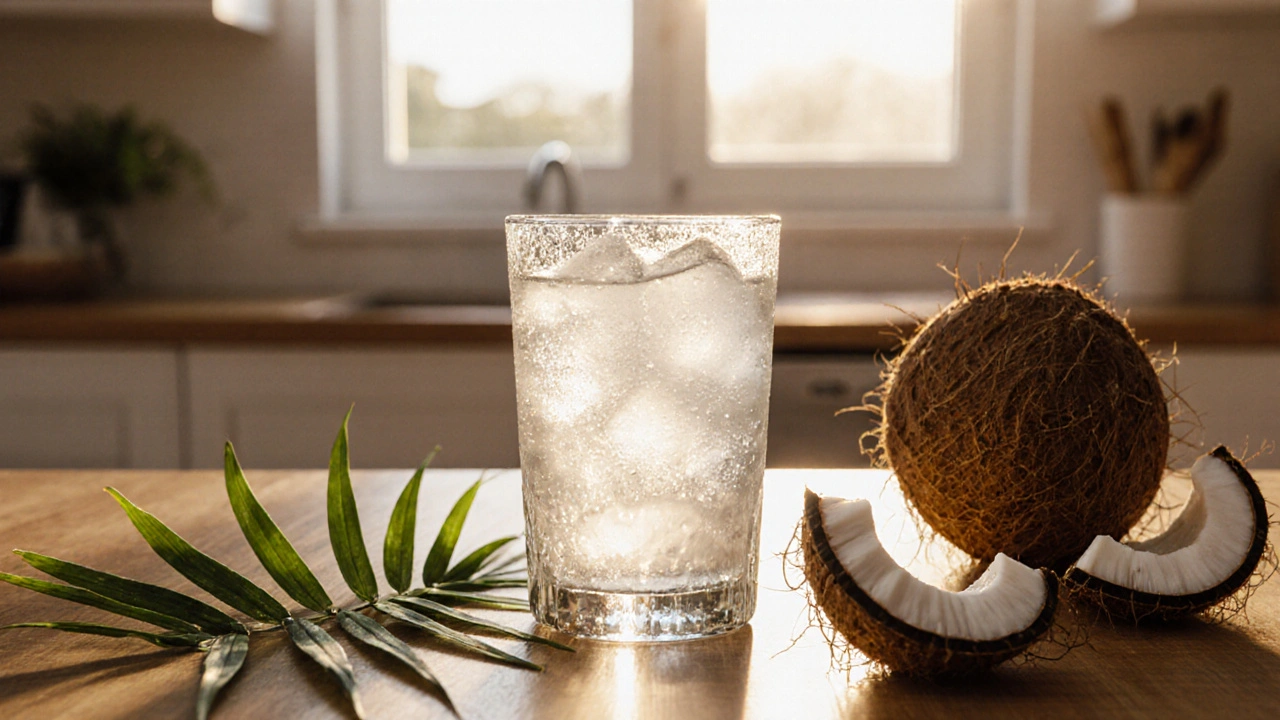
Water is the gold standard for hydration. But if you’re tired of plain water and want something that gives you a little more - without the sugar crash or artificial junk - you’re not alone. Millions of people are looking for the next best thing to drink after water, and the answer isn’t a soda, energy shot, or sugary sports drink. It’s something simpler, cleaner, and actually good for you.
Coconut Water: Nature’s Electrolyte Drink
Coconut water isn’t just trendy - it’s backed by science. A 2012 study published in the Journal of the International Society of Sports Nutrition found that coconut water rehydrated participants just as well as sports drinks, but with fewer sugars and no artificial additives. A 11-ounce serving of unsweetened coconut water has about 45 calories, 600 mg of potassium, and natural electrolytes like sodium and magnesium. That’s more potassium than a banana.
It’s not a magic bullet for energy, but it’s perfect for light workouts, hot days, or when you’ve had too much coffee. Look for brands with no added sugar, no flavorings, and a short ingredient list: just coconut water. Brands like Harmless Harvest and Vita Coco Pure work well. Avoid anything labeled “flavored” or “with vitamins” - those usually mean extra sugar or synthetic additives.
Herbal Teas: Calm Energy Without the Jitters
Tea isn’t just for relaxing. Certain herbal teas give you gentle, lasting energy without caffeine crashes. Matcha green tea is one of the best. It’s made from ground whole tea leaves, so you get all the nutrients - including L-theanine, an amino acid that smooths out caffeine’s sharp edges. One cup of matcha has about 70 mg of caffeine - less than coffee - but the L-theanine helps you stay focused for hours without feeling wired or anxious.
Other options: yerba mate, which has a similar caffeine kick to coffee but with antioxidants and a slightly earthy taste, and rooibos, a naturally caffeine-free tea from South Africa packed with polyphenols. Brew them hot or cold. Keep it simple: no sugar, no honey unless you’re using a teaspoon or less. A 2023 analysis from the University of Queensland found that people who drank 2-3 cups of herbal tea daily had better hydration markers than those who drank only water or sugary beverages.
Infused Water: Flavor Without the Fuss
If you find water boring, try making it interesting. Infused water isn’t just a Instagram trend - it’s a smart, zero-calorie way to get your fluids in. Slice up cucumber, lemon, lime, mint, berries, or even ginger and drop them into a pitcher of cold water. Let it sit for a few hours in the fridge. You get subtle flavor, a hint of vitamins from the fruit, and no added sugar.
Here’s what works best in Brisbane’s heat: cucumber and mint for a crisp, cooling taste, or orange and thyme for a citrusy lift. A 2024 study in the Australian Journal of Nutrition showed that people who drank infused water consumed 18% more fluids per day than those who stuck to plain water. It’s not about replacing water - it’s about making water easier to drink.
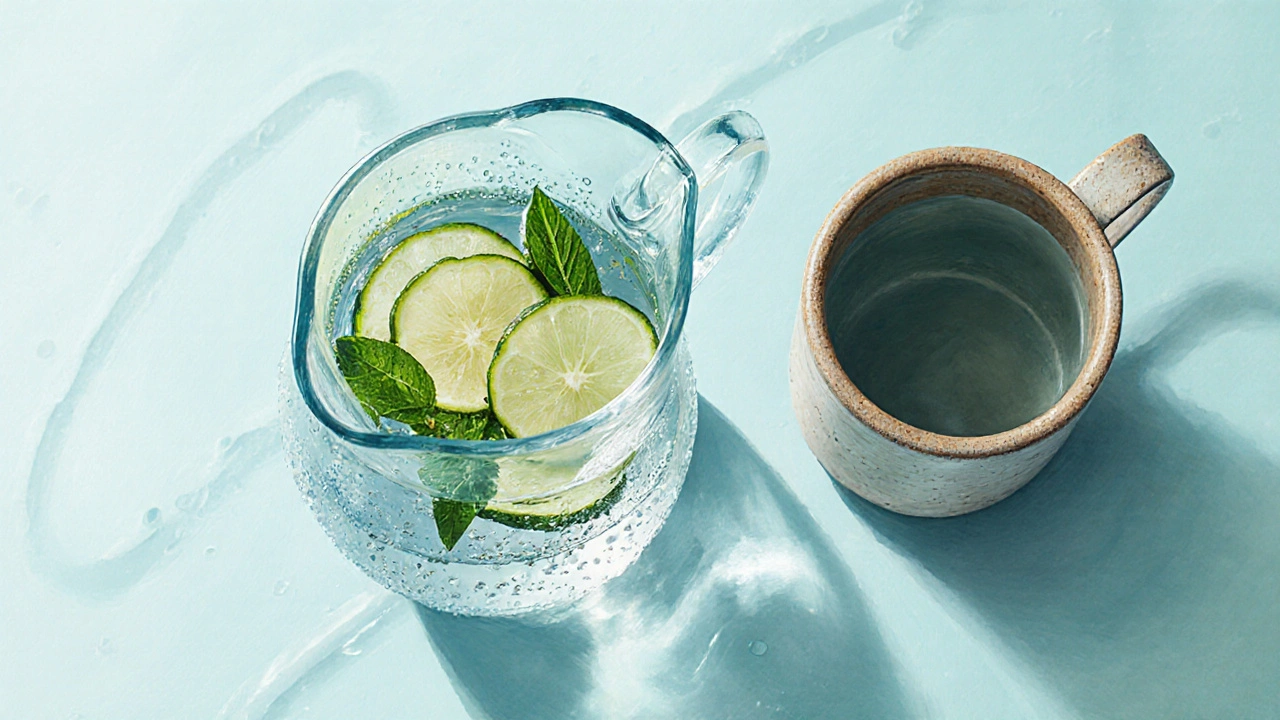
Kombucha: Fermented Flavor with Gut Benefits
Kombucha is a fermented tea drink that’s fizzy, slightly tangy, and full of probiotics. It’s not a replacement for water, but it’s a great occasional alternative if you want something bubbly without the sugar spike. A typical 8-ounce bottle has 2-3 grams of sugar - far less than soda or even juice. Look for brands with less than 5 grams of sugar per serving. Health-Ade and Brew Dr. are reliable options in Australia.
The fermentation process creates organic acids and live cultures that may help gut health. A 2021 study from Monash University found that regular kombucha drinkers had improved markers for digestion and reduced bloating. But don’t overdo it - stick to one serving a day. Too much can cause bloating or upset stomachs in sensitive people.
Electrolyte Water: For Active Days or Hot Weather
When you sweat a lot - whether from exercise, heat, or illness - plain water isn’t enough. You lose sodium, potassium, and magnesium. That’s when electrolyte water makes sense. Look for options with no added sugar, no artificial colors, and at least 200 mg of sodium and 100 mg of potassium per serving.
LMNT and Nuun are popular choices globally. In Australia, you’ll find Hydralyte and Pedialyte in pharmacies - both are formulated for rehydration, not for energy. They’re not sweet like sports drinks. They taste a little salty, but they work. Use them after a long bike ride, a day at the beach, or if you’ve had the flu. They’re not for everyday sipping - save them for when your body really needs them.
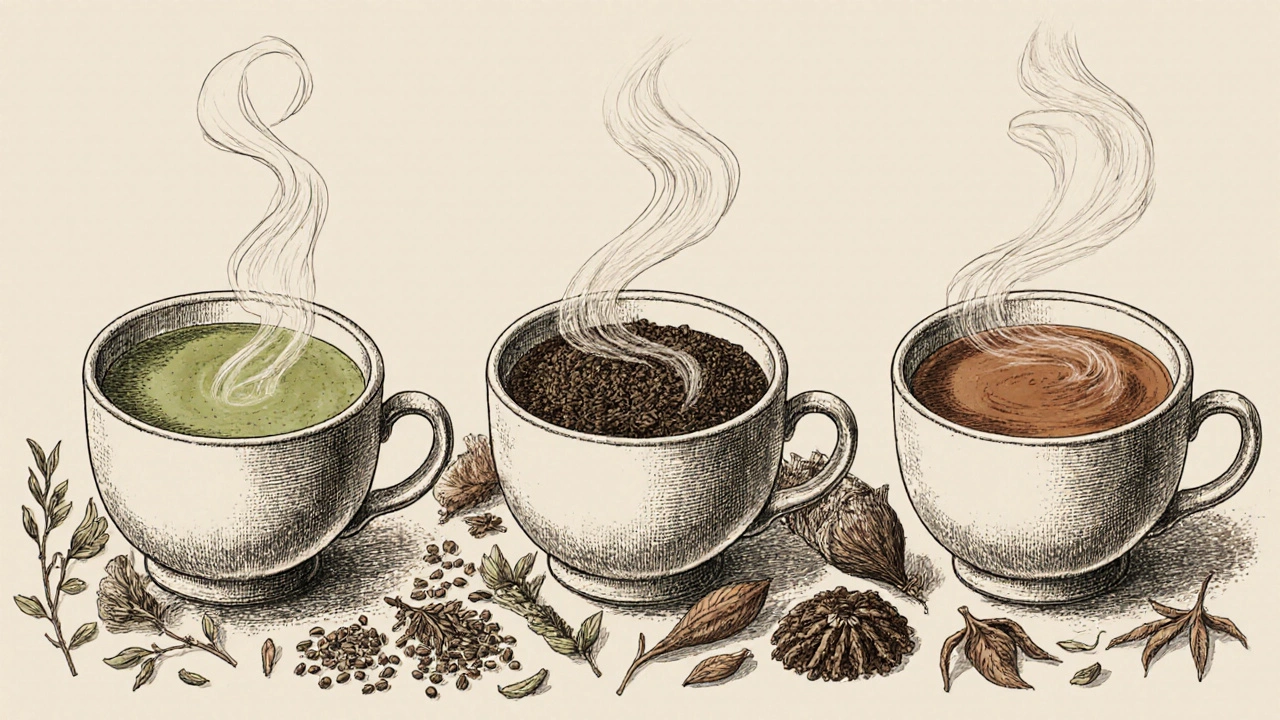
What to Avoid: The Hidden Traps
Not all “healthy” drinks are healthy. Many brands slap on labels like “natural,” “organic,” or “low-calorie” while still packing in sugar or artificial sweeteners.
“Energy waters” like Bai or Vitaminwater? They often have 10-20 grams of sugar per bottle - that’s 2-5 teaspoons. Even “zero-calorie” drinks with sucralose or acesulfame-K can mess with your gut bacteria and cravings over time, according to a 2023 meta-analysis in Nutrients.
And don’t fall for “adaptogenic” drinks with ashwagandha or rhodiola. They’re trendy, but there’s little evidence they boost energy in healthy people. Stick to the basics: water, tea, coconut water, infused water, kombucha, and electrolyte solutions when needed.
Real-Life Scenarios: What to Drink When
- First thing in the morning: A glass of warm water with lemon. Then switch to matcha or herbal tea.
- After a morning workout: Coconut water or electrolyte water if you sweated heavily.
- Mid-afternoon slump: Cold-brewed yerba mate or a cup of green tea. Avoid coffee after 2 p.m. if you’re sensitive.
- After dinner: Herbal tea like chamomile or rooibos. Keeps you hydrated and helps wind down.
- On a hot day: Infused water with citrus and mint. Keep a pitcher in the fridge.
- Feeling under the weather: Electrolyte solution + broth. Skip the sugary juices.
The Bottom Line
The next best thing to drink after water isn’t one thing - it’s a few smart choices that fit your day. Coconut water for electrolytes, herbal tea for calm energy, infused water for flavor, kombucha for gut health, and electrolyte water for recovery. All of them are better than soda, energy drinks, or sweetened juices.
Water is still the star. But these drinks? They’re the supporting cast that makes hydration easier, tastier, and more effective. You don’t need to replace water - just make it more enjoyable. And when you do, you’ll find yourself drinking more, feeling better, and skipping the crashes.
Is coconut water better than sports drinks?
For most people doing light to moderate exercise, yes. Coconut water has fewer sugars, no artificial ingredients, and more potassium. But for intense workouts lasting over 90 minutes or in extreme heat, sports drinks with sodium and carbohydrates may be more effective at replacing lost electrolytes and fueling muscles.
Can I drink kombucha every day?
One 8-ounce bottle a day is fine for most people. But if you’re new to fermented foods, start with half a bottle to see how your gut reacts. Avoid it if you’re pregnant, have a compromised immune system, or get bloated easily. Always check the sugar content - some brands add too much after fermentation.
Are herbal teas really hydrating?
Yes. Despite the caffeine in green tea and yerba mate, studies show that moderate amounts (up to 4 cups a day) contribute to daily hydration. The diuretic effect is mild and doesn’t outweigh the fluid intake. Herbal teas like chamomile and rooibos are caffeine-free and hydrate just like water.
What’s the best drink for energy without caffeine?
Infused water with citrus or ginger can give a refreshing lift. Also, try a small glass of beet juice - it’s rich in nitrates that help improve blood flow and oxygen delivery. Or simply take a 10-minute walk outside. Sometimes, what feels like low energy is just dehydration or lack of movement.
Should I drink electrolyte water daily?
No. Electrolyte water is meant for recovery after heavy sweating, illness, or intense exercise. Drinking it every day can lead to too much sodium or potassium, especially if you’re not active. Stick to water or herbal tea for daily hydration unless you have a specific need.

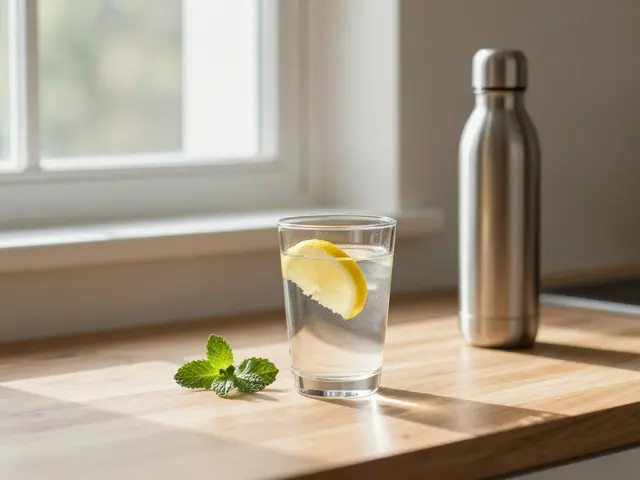
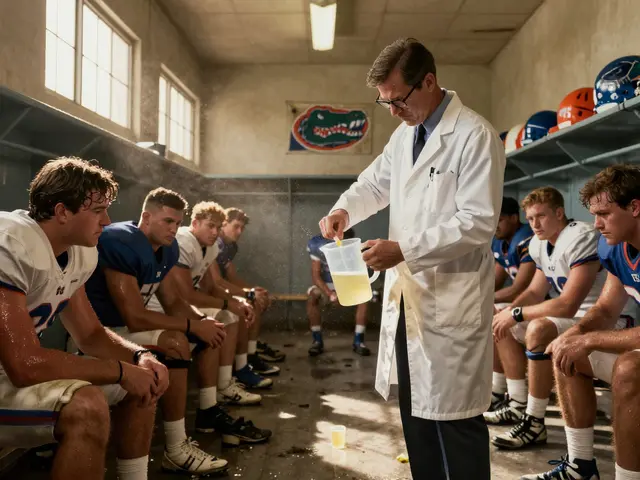
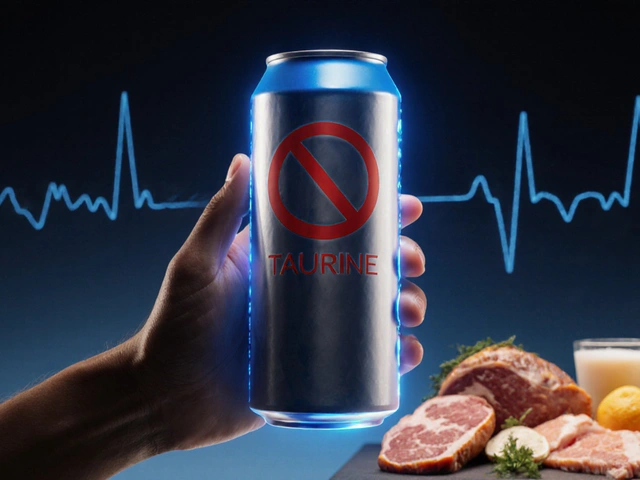
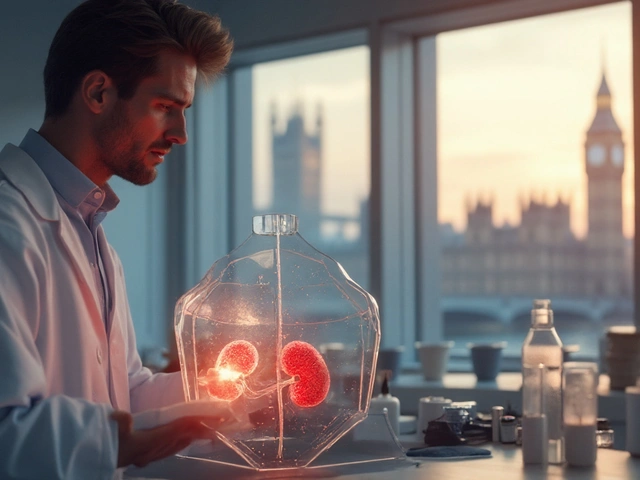
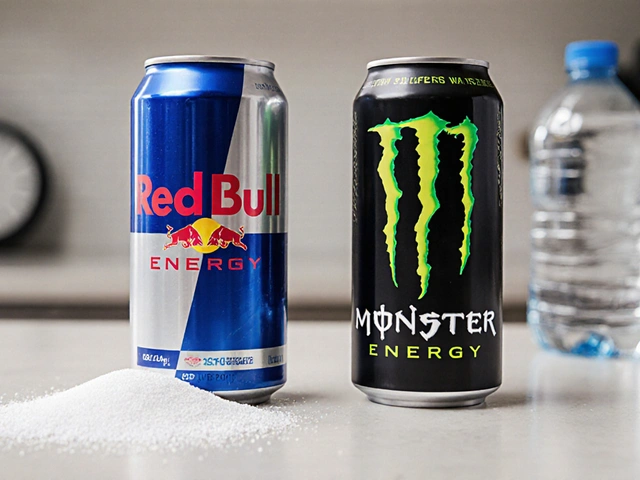
Comments (8)
Karl Fisher
18 Nov 2025
Let’s be real - coconut water is just nature’s Gatorade for people who think they’re above electrolyte powders but still need to hydrate after yoga. I’ve had the whole ‘artisanal’ coconut water phase. It’s fine. But honestly? I just drink water and eat a banana. Same potassium. Less plastic. Less $12 price tag. Still, I respect the aesthetic. 🥥
Buddy Faith
19 Nov 2025
Coconut water is a scam. The FDA knows it. The coconut farmers know it. The guy selling it at Whole Foods knows it. They pump it full of fructose then slap ‘natural’ on it. You think you’re being healthy but you’re just feeding the corporate hydration cult. Drink water. Or nothing. That’s the real detox.
Scott Perlman
21 Nov 2025
I switched to herbal tea last year and my energy hasn’t crashed once. No more 3pm zombie mode. Just calm, steady focus. Matcha is my go-to. No sugar. Just tea and peace. Try it. Your body will thank you.
Sandi Johnson
22 Nov 2025
Oh wow. A 2023 study from the University of Queensland. How dare you cite actual science in a world that prefers TikTok nutritionists. I’m shocked. Shocked I tell you. Next you’ll tell me water hydrates you. What a revolutionary concept.
Eva Monhaut
23 Nov 2025
I grew up in Mumbai drinking nimbu pani with a pinch of salt and black pepper - no sugar, just citrus and spice. It was our daily ritual. Turns out, that’s basically infused electrolyte water with cultural soul. The article nails it - hydration isn’t about trends, it’s about listening to your body. Simple. Beautiful. Real.
mark nine
24 Nov 2025
Infused water works. I do lemon and mint. Keeps me drinking more. No magic. No hype. Just cold water with fruit. I’ve been doing it for 5 years. No crash. No guilt. Just sipping. Why make it harder than it is?
Tony Smith
24 Nov 2025
While I find the article’s recommendations largely commendable, I must respectfully challenge the assertion that kombucha constitutes a viable daily hydration strategy. The microbiological activity, while potentially beneficial, introduces variables that may not align with the physiological imperative of consistent, neutral fluid homeostasis. I recommend reserving it for ceremonial occasions, much like one might reserve champagne for special events.
Rakesh Kumar
26 Nov 2025
Bro, I tried kombucha for the first time last week and my stomach felt like it was hosting a rave. I thought it was healthy but it was just fizzy sugar with bacteria. Now I stick to masala chai - real tea, real ginger, real cardamom. No labels. No hype. Just warmth and flavor. And yes, it hydrates. India knew this 5000 years ago.